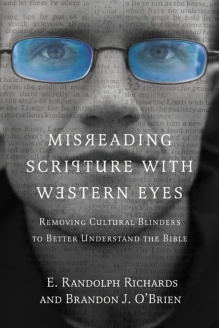I am thankful for the little numbers that have been added to my Bible. In general the chapter and verse numbers are extremely helpful. However, when we come to study the Bible, the placement of the chapter and verse breaks can prevent us from seeing what the Author/authors intended to communicate. Thankfully, there are some “magic” words in the text that can help us and our children see past the little numbers to what God has to say to us.
When Paul wrote to Timothy that scripture is “God breathed”, he meant that it has divine origins and is therefore powerful in a way that human-conceived writings aren’t. But, there’s a second amazing truth hidden there too: God has communicated his divine, eternal thoughts in a way that the human mind can comprehend and be affected by. Which brings us to… grammar!
Grammar’s Secret Origins
Like Superman, Grammar is not of this world. Grammar is rooted in God’s essential nature: loving relationship. After all “in the beginning was the Word and the Word was with God and the Word was God.” We can have confidence then that since language is rooted in the nature of God, his thoughts can be received in every language! Grammar gives us the keys to understanding them.
How grammar helps your family understand the God of Everything’s Thoughts.
In a word, conjunctions, the “magic” words I mentioned above (examples: therefore, for, as, but, and, or, neither, nor, and, yet, since, so, etc.) Conjunctions show how ideas are connected and therefore they help us see past the “little numbers” when they are being unhelpful. Look for conjunctions across paragraph, chapter and verse breaks to show if and how two ideas are connected.
So many conjunctions: an example from Matthew 7:7-12
These verses contain 3 sections that are fairly well-known individually. However, by noting the conjunctions, (two in particular), we are able to 1) avoid “verse break syndrome”, 2) protect ourselves from “section heading-itis, and 3) discover the big idea in the passage.
In verse 7 Jesus gives us the famous command, “Ask, and it will be given to you…”. In verse 9 he says “Or which one of you, if his son asks him for bread will give him a stone?” And finally in verse 12 he gives the “Golden Rule”, “So whatever you wish that others would do to you, do also to them.
Perhaps you are like me, familiar with the passages individually but unaware that they are intended to be understood as a unit. We kind of get the “Golden Rule” and the “Ask, Seek, Knock” part although kind of mysterious could be connected to prayer, and sure, I’m not going to give my kid a snake instead of a fish but how do these relate?
The Power of “OR”
The conjunction “or” in verse 9 tells us that vv.7-8 are analogous to vv.9-11. They are talking about the same thing in two different ways: when you ask God for what you need won’t he give to you what you ask for? So far so good…
At this point, my Bible (and yours too, probably) unhelpfully interjects a paragraph break and the heading “The Golden Rule”. But wait! There’s another conjunction: so!
SO what?
By employing the word “So”, (similar to “therefore”), Jesus is giving a reason for why you do for others what you wish that others would do to you. It’s not just a selfless act to make a kinder world, it is an act based on our understanding that God will provide for our needs so we provide for the needs of others. In essence, we become a pipeline of God’s material care for humanity because we are assured of the loving provision of our perfect Heavenly Father. The reason makes all the difference and emphasizes our life-giving connection to God!
Family Excercise:
Read Matthew 6:22-23 together. Entertain ideas about what it means, scratch your head and say “huh?”. Then read from v.19 through v.34. Pay attention to the conjunctions and see if you can figure out a contextually grounded, grammar-wise interpretation…and the big idea. P.S. Ignore those pesky, little numbers, paragraph breaks and section headings.
 teach your children (and maybe educate yourself) on the life-giving truths in God’s Word, I highly recommend this book for several reasons:
teach your children (and maybe educate yourself) on the life-giving truths in God’s Word, I highly recommend this book for several reasons: As Christian parents who believe in the truth, beauty and power of God’s Word, we have a profound interest in the careful study and application of the Bible. While the most important truths of scripture are “low-hanging fruit”, much of scripture is subject to misinterpretation for various reasons, not least of which is our modern western culture’s distance from the culture of the ancient Near-East in which the Bible’s authors wrote.
As Christian parents who believe in the truth, beauty and power of God’s Word, we have a profound interest in the careful study and application of the Bible. While the most important truths of scripture are “low-hanging fruit”, much of scripture is subject to misinterpretation for various reasons, not least of which is our modern western culture’s distance from the culture of the ancient Near-East in which the Bible’s authors wrote.